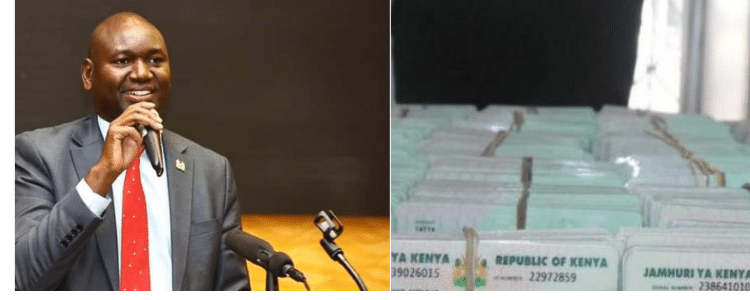The Office of the Ombudsman (Commission on Administrative Justice-CAJ) has issued a seven-day ultimatum asking the government to respond to demands raised about delays in issuing National Identification cards (IDs).
In a letter on August 1, 2024, the Kenyan Ombudsman directed the Director of the National Registration Bureau (NRB) to respond within seven days to issues raised about delays in IDs issuance.
According to CAJ, this directive follows numerous complaints highlighted by Kenyans across various media platforms.
“Pursuant to Section 8 of the Commission on Administrative Justice Act, 2011, the Commission acknowledges the serious complaints reported concerning delays in the processing and issuance of ID cards,” stated the Ombudsman.

The Office of the Ombudsman noted that media reports indicate that parents and students waiting for enrollment to higher learning institutions are facing challenges due to delays of IDs issuance.
Ombudsman Issues Demands to the Director of the National Registration Bureau
Further, CAJ highlighted that the delays are impacting the students’ ability to access essential services such as Higher Education Loans Board (HELB) financing, travel documents, and employment opportunities.
Among the issues that the Commission wants communicated is the expected timelines for issuing the pending ID cards.
Also Read: Court Throws Digital ID, Maisha Number in Limbo After Ruling
Also, the NRB Director has been urged to address the challenges currently facing the department in processing and issuing IDs and disclose any measures the department has implemented to address the delays.
The Kenyan ombudsman further asked the director to address service delivery timelines related to the issuance of ID cards.
This demand letter follows a High Court suspension on the implementation of the Unique Personal Identifier known as Maisha Card, which the government had announced will be renewed every 10 years, pending determination of a petition filed by a Garissa-based lobby group.
High Court judge Justice Lawrence Mugambi suspended issuance of Maisha Namba, the rollout of the 3rd Generation ID card, the Maisha Digital ID and Maisha Database, which is expected to consolidate existing and independent databases into a single register.
“The Court is satisfied that based on the latest disclosure, an order staying any further and/or continued implementation pending the hearing and determination of this application ought to issue,” the judge said.
Maisha Namba Cards
The lobby group named Haki Na Sheria Initiative stated that the government had confirmed the mass collection, processing and storage of data with plans to issue a UPI and the Maisha Digital ID and the enrollment of the Maisha database.
Also Read: Govt Explains Why New National IDs Will Expire
However, the constitutionality of the database has been disputed and the matter is pending hearing before the High court on October 4, 2024.
The lobby said there is a great risk that members of the public will be prejudiced as certain types of personal information will be disclosed and their right to privacy breached, in the absence of proposals on how the data will be protected.
Notably, this is the third attempt of stopping rollout after last year’s temporary stoppage of Maisha Card, before the order was lifted in February.
The ruling came after the government in an update earlier in July announced that it had purchased a new IDs’ printing machine, hoping to avert a crisis over delayed issuance of the critical documents.
Principal Secretary for Immigration and Citizen Services Julius Bitok said in the update said that NRB had issued 972,630 Maisha cards, out of which 531,329 comprised new applications since the digital ID was introduced in November last year, while 441,301 were duplicates.
“The NRB appreciates the importance of the national ID card as a constitutional right and an essential identification document and will strive to ensure eligible Kenyans obtain it as soon as possible,” said Bitok.
“To meet the rising demand for services, NRB has acquired a modern printer and enhanced the printing capacity to 30,000 national ID cards per day against an average demand of 10,000 applications.”
Follow our WhatsApp Channel for real-time news updates!
https://whatsapp.com/channel/0029VaB3k54HltYFiQ1f2i2C




![14 Companies To Be Granted New Mining Licenses By Govt [Full List] Cs Joho Lists 14 Firms Seeking Mining Licences, Kenyans Given 42 Days To Respond]( https://thekenyatimescdn-ese7d3e7ghdnbfa9.z01.azurefd.net/prodimages/uploads/2025/11/Mining-CS-Hassan-Joho-touring-the-Voi-Gemstone-in-Taita-Taveta-County-on-Friday-August-16-2024.-PHOTOJoho-360x180.png)






































































![14 Companies To Be Granted New Mining Licenses By Govt [Full List] Cs Joho Lists 14 Firms Seeking Mining Licences, Kenyans Given 42 Days To Respond]( https://thekenyatimescdn-ese7d3e7ghdnbfa9.z01.azurefd.net/prodimages/uploads/2025/11/Mining-CS-Hassan-Joho-touring-the-Voi-Gemstone-in-Taita-Taveta-County-on-Friday-August-16-2024.-PHOTOJoho-120x86.png)